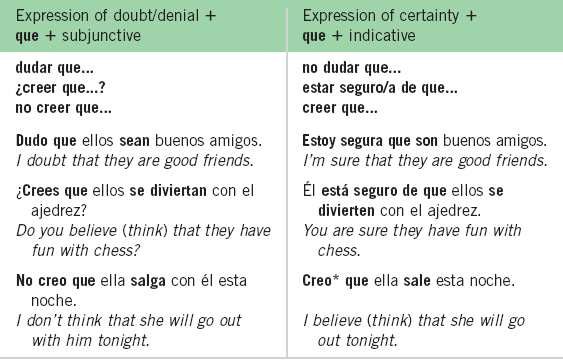In this lesson, we will learn how to express doubt, disbelief, and denial in Spanish using the present subjunctive. The subjunctive is one of three moods in Spanish. It is often used to talk about doubts, possibilities, desires, and wishes. The other two Spanish moods are the indicative and the imperative.
Expressing doubt and denial in Spanish
Common verbs to express doubt and denial
| dudar | to doubt |
| nopensar | to not think |
| no estar seguro | to be unsure |
| no comprender | to not understand |
| no creer | to not believe |
| negar | to deny |
| no suponer | to not assume |
| no parecer | to not seem |
| ser posible | to be possible |
| no es posible | to be not possible |
| ser imposible | to be impossible |
| no ser verdad | to be not true |
| ser dudoso | to be doubtful |
| no ser seguro | to be not sure |
| no ser probable | to be not probable |
Verbs that follow the verbs "comprender" (to understand), "pensar" (to think), "creer" (to believe), "parecer" (to seem), "estar seguro" (to be sure), and "suponer" (to assume) are normally used in the indicative.
Verbs that follow that negated forms of the above verbs (no comprender, no estar seguro, etc) are normally used in the subjunctive.

Expressing doubt, denial, and certainty using the subjunctive and indicative in Spanish
There are often three main parts to a subjunctive sentence:
- Two subjects
- Relative pronoun (que, quien, como)
- The trigger (verb or expression that signals that subjunctive is needed)
- Two clauses
When we use impersonal expressions, "ser" is conjugated in the third person singular. The word "It" in English doesn't have an equivalence in Spanish.
For examples:
No es cierto que España no tenga un Rey - It is not true that Spain doesn't have a king
Creo que te va a gustar esta canción - I think you're going to like this song (indicative)
No creo que te vaya a gustar esta canción - I don't think you're going to like this song (subjunctive)
Dudo que él tenga mi número de teléfono - I doubt that he has my phone number
No parece que vaya a mejorar la situación - It doesn't appear that the situation will improve
No es probable que el ministro vaya a renunciar - It is not probable that the minister is going to quit
See also: Making recommendations and giving advice in Spanish
Follow our site for Spanish to English translation, dictionary, daily grammar, and vocabulary lessons,
